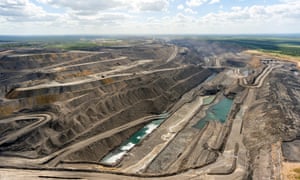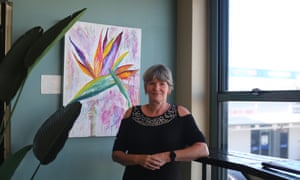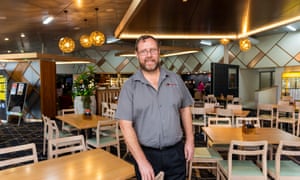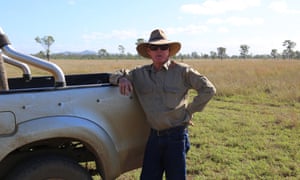Existential angst and confused politics on a 1,000km stretch from Bundaberg to Townsville
A few hundred clicks down a dusty Queensland highway, on the plateau of the Great Dividing Range, is the country’s most remote commuter traffic jam.
Moranbah is bustling, on the upswing of another boom-bust cycle. The town was built in the 1960s to support coalminers; today they are the ones clogging the roads, heading to and from shifts at more than a dozen nearby operations.
“We’re not just a one-road town,” says Kim Sinclair, a coalminer who has lived in Moranbah for 15 years. “When you can’t get a car park, when you have to wait three weeks to get a doctor’s appointment, you know the place is pumping.”
Some locals dismiss the notion that coalmining, and coal communities, are facing an existential threat. Most mines near Moranbah supply metallurgical coal, used in steelmaking, and are likely to be less severely affected by any global shift away from fossil fuels.
Sinclair sees the other common reaction on a daily basis, even feels
it herself: “fear and distrust and defensiveness” that their jobs, their
homes, their communities are at risk from the ripple effects from
action on climate change.Moranbah is bustling, on the upswing of another boom-bust cycle. The town was built in the 1960s to support coalminers; today they are the ones clogging the roads, heading to and from shifts at more than a dozen nearby operations.
“We’re not just a one-road town,” says Kim Sinclair, a coalminer who has lived in Moranbah for 15 years. “When you can’t get a car park, when you have to wait three weeks to get a doctor’s appointment, you know the place is pumping.”
Some locals dismiss the notion that coalmining, and coal communities, are facing an existential threat. Most mines near Moranbah supply metallurgical coal, used in steelmaking, and are likely to be less severely affected by any global shift away from fossil fuels.
“The conversation is not about solutions and outcomes that are going to benefit people, so you go into a sort of survival mode ... you lose sight of the bigger picture,” Sinclair says.

“Community members feel a sense of urgency to protect what they have and make sure they’re secure. And what you end up with is this massive recipe for disaster.”
Moranbah lies at the heart of a chain of four marginal federal electorates in central and north Queensland – Flynn, Capricornia, Dawson and Herbert – a 1,000km stretch from Bundaberg to Townsville, which alone could swing the election.
The vast area takes in regional cities at various stages of the boom-bust cycle; it links cattle and cane communities, mining towns and tourism hubs on the Great Barrier Reef.
"We will fight to the very end to make sure there is genuine recognition for our regional areas"
In the political narrative, regional Queensland has become the anti-city, where they grow the soy for urban cafe soy lattes, and where checking unemployment is the overriding concern.
The reality of the region is a patchwork of views, often differing markedly from one community to the next, and a confused politics shaped by the never-flinching conflict between climate, coal and jobs.
‘We don’t have a normal climate anymore’
In the cattle country on the outskirts of Rockhampton, Australia’s beef capital, farmers such as Mick Alexander have known for a while that “something is going on, it’s not normal”.“We’re the ones out in the heat every day,” he says. “We’ve had so much extreme weather in the last four, five, six, seven years. We’re going from huge dry periods to floods, to extended droughts.
“We don’t have a normal climate any more, we have this climate where we have to be ready for rain ... you have to have your country ready to take rain any time of the year.”
Alexander’s property, Bindaree, stretches over 70 paddocks along the banks of the Fitzroy River. He talks proudly about the farm’s intensive rotational grazing practices, and how farmers can be better supported to manage their land to keep carbon in the soil.
Like many others in the area, Alexander was a long-term National party voter. But he says the party “can’t point to a single time they’ve supported farmers ahead of coalminers”.
“In the rest of the community, there’s a really big swing away from National party voting. People are wondering whether they can vote for either major party because there’s a disconnect between what the party says and what people think,” Alexander says.
“Pauline Hanson has got a really big hook in this area because she says the sorts of things that people want to hear, that other politicians are scared to say. They don’t want to talk about anything that might be negative. She’s pretty pro-coal too, but at least she’s supporting farmers.
“We want people in politics who want to represent the people, not big business. There are no statesmen left in the LNP. Scott Morrison honestly reminds me of Fozzie Bear in the Muppets: his pretend smile and everything’s fake about him.”
‘The boom did more damage than good’
I ask Marion Hughes, an artist based in the central Queensland city of Gladstone, how to get to the main street. She laughs.“This is it, this is the main street,” Hughes says, pointing to a couple of empty shopfronts. “If you came down here of a weekend, you’d not run in to anybody.”

And then came the bust, when the construction of large scale projects wound up and jobs disappeared as quickly as they had been created. The gallery was forced to close.
“In the end I think the boom probably did more damage than it did good,” Hughes says.
“Things changed so quickly. We bought at the height of the boom and now we can’t afford to leave. We’re getting older and I worry about healthcare. If you go to the hospital here they never have enough staff, it’s always just too busy. These are things you worry about.
“[The gallery] was my dream. But in the end it just wasn’t viable any more.”
Gladstone provides an interesting case study for those clamouring for the One Big Project as a cure for a regional economy’s ills. The cost of living – reflected in things such as housing or a meal at a restaurant – increases as cash flows through the community. Many long-term locals were unable to afford to stay in Gladstone.
Anna Hitchcock, from the Gladstone conservation council, says the city lost a lot of its cultural and community side and was “poorer for it”.
“When you have a boom you have a Fifo workforce ... and often that’s not great for a town’s fabric.
“People were literally pushed out because they just could not pay rent. There’s no bookstore in Gladstone anymore. The little secondhand places vanished. So this is what I mean when I say we’re poorer. We’ve got big box chain stores but none of the other stuff that makes life interesting.”
One of the town’s remaining large employers is the ageing coal-fired power station, the largest in Queensland, which many believe will close within a decade.
With an eye on the future, the conservation council has started Repower Gladstone. Hitchcock says the region retains an enviable skill base – “engineers and miners and chemists” – who could turn Gladstone into an innovation and renewable hub.
‘We will fight to the very end’
The idea of a transition away from fossil fuels naturally sticks in the craw of many in regional Queensland; those whose jobs and communities are supported by the coal industry and, in places such as Townsville, where the promise of lucrative coal jobs provides a hopeful salve for high unemployment.Australia is, mostly, not the end user of the coal mined in the Bowen basin. Some of the most vocal supporters of coal cling to optimistic export projections, while refusing to consider the long-term risk to mining communities should the Paris agreement succeed.
But that existential risk remains. And for people such as Kim Sinclair, one of the biggest problems is that few outsiders understand the scale of what will be required should coal workers and communities need to be supported.
“When you start having conversations about closures or a ramp-down, all of that comes with consequences for us in the medium term. Even if most of the mines here are [metallurgical] coal, people lose confidence in the area, they lose confidence to invest.
“If we stop seeing progression with infrastructure, then unfortunately for us it’s a long slow road to demise because it doesn’t happen overnight. It’s something that very slowly and systemically creeps in.
“We will make sure it doesn’t, we will fight to the very end to make sure there is genuine recognition for our regional areas, and we’ll fight to make sure our people are protected and as secure as possible.”

“It needs to be about outcomes,” she says. “Not just a pissing contest about whose idea was this, and who is going to get credit for it. Nothing is going to change.
“A transition is totally possible … but it’s about our leaders and our government bodies setting aside their own perceptions and sitting down at the table with the main job to make sure we have secure, protected workers, no matter what industry they work in or end up in. It cannot simply be left to multinational companies or industry to regulate it. They cannot self-regulate beyond their profit line.
"They’re both as bad as each other. Nothing ever changes"
“They cannot be given the power to decide how and when industries are turned on or turned off, which we all know means families, communities and people are going to suffer and be left behind; it’s going to decimate the way we live and the fabric of society.”
Last month, Sinclair spoke at a Queensland parliamentary committee hearing into a proposal to ban coalmining in the Galilee basin. She said the bill made no mention of the human lives it would affect – “not one word” – and that attitude amid the climate debate treated workers like pawns in a bigger game.
“My mother is buried in the cemetery at the start of town,” Sinclair says.
“That’s the fear that it represents to me. What do I do if this place doesn’t exist anymore? I’m leaving behind pieces of my life that mean so much to me. The feeling of hopelessness that you immediately feel, the fight or flight mode kicks in. It breaks your heart because I’ve invested a good portion of my life and my children’s life and created a family here.”

“I don’t think there’s uncertainty about the future,” Dowd says.
“I think there’s anger and confusion that these people don’t feel that other people value the hard work they do.”
Two tribes go to war
In an editorial on Wednesday that cheered on Adani’s Carmichael coalmine, the Courier-Mail declared the state had divided into two distinct camps.“Over recent decades we have watched as people have retreated into tribes – the anti-development camp coalesces around almond milk lattes at West End cafes while those with a more pro-mining bent are found in pubs on the Strand in Townsville or Shakespeare Street in Mackay,” the Brisbane-based newspaper said.
“Those who are fussy enough about what they’re eating – eschewing red meat perhaps – are picking over their roasted cauliflower in James Street, Fortitude Valley as others who dream of tomahawk steaks are looking for a fair-dinkum restaurant in Fitzroy Street, Rockhampton.”
On Fitzroy Street, the electronic billboard above a central intersection cycles between election advertisements that treat voters like Tribe B. One side will support jobs. The other side will cost jobs. The ads play on an endless loop.
“They’re both as bad as each other” a local says, looking up after leaving the Criterion Hotel. “Nothing ever changes.”

No comments:
Post a Comment